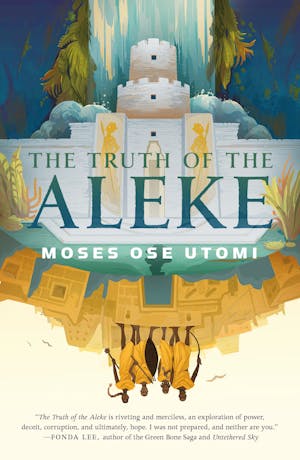The Truth of the Aleke is the sequel to Moses Ose Utomi's The Lies of the Ajungo and the middle novella in Utomi's Forever Desert trilogy. It takes place 500 years after The Lies of the Ajungo, which was a really good novella following a protagonist who sets out into the desert from an oppressed city to find water for his mom, only to discover the world he knows was lies and who then in the triumphant-esque climax takes action to end the true source of that oppression (I'm trying to leave out some spoilers here). I liked that novella a lot so I put this novella on my list to try to read as soon as it came out, even if its description made it sound a more spiritual successor and stand-alone than a sequel.
That assumption was wrong - The Truth of the Aleke is a true sequel, despite the centuries that have passed since the first work, and tries to very deliberately set up another world dealing with potential oppression from outsiders and then use the parallels to the first novella to surprise readers who are expecting more of the same. It's an interesting result, with a strong lead character, but I found the final swerve of this book kind of too abrupt to work fully for me. That said, it's an interesting way of portraying cycles of oppression and the idea of how truth is what those in power portray, which is a central theme of this series. More specifics below the jump:
Plot Summary:
Osi only wants to do right. He sees injustice and he acts to right it, whether that is him seeing petty thieves in town or him knowing of the powerful enemy known as the Aleke that has besieged the City of Truth for 3 centuries and has only been held back by the efforts of its elite warriors, the Truthseekers. This impulse to always do right has often gotten him into trouble and now threatens his ability to join the Peacekeeper force that works under the Truthseekers to defend the city.
Yet when an Aleke attack devastates the city, Osi takes action in a way that gets him invited into the Truthseekers and gives him a chance to take an offensive to the hated enemy...an offensive that will change everything Osi knows about the world and his City and all that is right....
Quick Thoughts: In the Acknowledgements at the end of this novella, Utomi compares this book's world to that of 9/11, where who was good and who was evil in the response thereto was sometimes hard to know, and the truths behind each party's actions was often questionable and depended upon the words of those in power. This latter part is part of the theme of this series for sure, as even in the first novella, where good and evil were defined, the truth of the Cities was kept hidden by those in power who instead inflicted their own realities upon their peoples, until Tutu rose up after his misery and seemed to end it.
Here in this second novella, we have a similar idea where what is real and true is dictated by those in power and who are currently winning, and the novella makes it clear from the start that something of that sort is happening: after all the background of the story inverts the truth of what we learned last book and makes Tutu the villain, which we the reader know is untrue...so we have good reason to doubt the truth Osi is facing and know a reversal is coming. But The Truth of the Aleke doesn't settle for just a repeat of the same twist of the last book, and relies upon a series of swerves and grey vs grey and questions of what is really true that is far more deep, complex, and without clear answers. It's interesting, if I'm not sure entirely successful - it relies upon a final act swerve that I didn't really buy with this book's short run time, which allowed some characters to succeed in ways that I didn't quite believe from the setup, even with me understanding that this setup had hidden things from me, the reader. Still, this is an interesting second novella and I'm fascinated to see where Utomi goes with the third and final novella (which I hadn't realized was a thing and thought this was a duology beforehand).

No comments:
Post a Comment